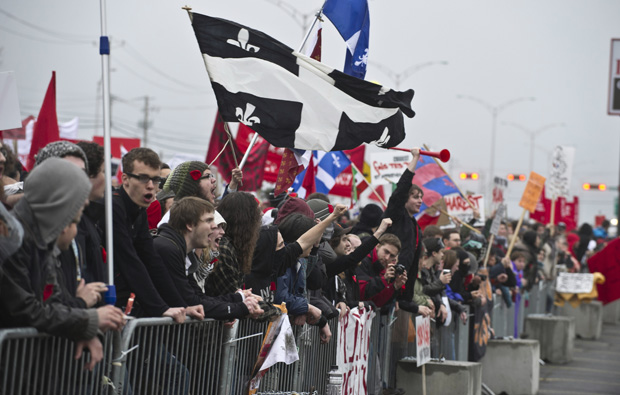Quebec politics are always interesting, and sometimes detestable. The past few months have proven this again to be true. Quebec students are marching in the streets by the tens of thousands on a regular basis demanding that the government reverse its plans to hike tuition rates to a level that would keep them paying less than any other student in North America. There has been violence, tear gas, broken windows and the provincial education minister has just quit.
The man at whom the chaos is targeted is Quebec’s Premier Jean Charest. Polls prior to the the street demonstrations showed him to be the least popular premier in Canada. Current polls show that the longest student strike in the province’s history have swayed the sympathy of few Quebecers. Elsewhere, scandals have mounted for Charest, the latest and most serious being allegations of corruption within the multi-billion dollar construction industry that seems to innervate every level of Quebec’s political class.
Charest must call an election by 2013, and if he is to survive facing long odds — as he has done before — he must be mindful of timing.
Quebec faces a summer of discontent, and the premier must be seen to be putting the house in order, or at least refusing to hand over the keys to the street mob. Acquiescing to student demands would be foolish and would remove electoral ammunition from Charest’s already dwindled stock. Earlier, Charest offered the students a deal he knew they wouldn’t accept — if only to illustrate that reason was contemptible to them. Quebec summers generally see a panoply of strikes and demonstrations from the labour movement. and — it being an election year in the U.S. — copycat occupy protests will return to the parks and streets of Montreal. Pressure will mount, and so will the impatience of ordinary Quebecers against the faction of society Charest would profit to wedge against.
Charest’s main electoral competitors are the Parti Quebecois, who promise to expand state benevolence to those seeking handouts, and the upstart party of François Legault. Legault’s CAQ promises a handful of right-leaning solutions for a province whose people have complained about the corrupt entitlement class of politicians running the show in the capital in Quebec City. If Charest has any hope of victory, he must tack right and co-opt Legault, and represent a populist champion against those who take from society at the expense of those who make society.
Say what you will about the issues of state largesse, what makes education accessible, or Charest’s fitness to be re-elected. The Premier will be making these calculations as he considers his political future in the coming weeks.
There is no better time for Charest than this summer to call an election and frame himself as a leader who will emphatically say ‘no’ to the students, and ‘no’ to the growing entitlement-seeking labour movement. It will only get worse for Charest as pressure from inquiries into corruption mount. Quebecers may not like Charest very much, but given the draining aspects of Quebec’s economy that he’s up against, he should be eager to show that a bold ‘no’ mandate may be the least detestable option.
